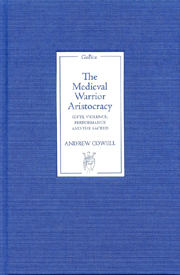Book contents
- Frontmatter
- Contents
- Acknowledgements
- Introduction
- 1 The Power of Giving
- 2 The Symbolic Constitution of the Giving Subject: William the Conqueror and Robert Guiscard
- 3 Violence and “Taking”: Towards a Generalized Symbolic Economy
- 4 Taking an Identity: The Poem of the Cid
- 5 The Sacred Kept
- 6 The Hero, Gratuity and Alterity: The Song Of Roland
- 7 The Supplemental Hero: Raoul of Cambrai
- 8 Female Integrity and Masculine Desires in The Nibelungenlied
- 9 Fractured Identities, and the Solution of Chivalry: William of Orange
- Conclusion: A New, Different Warrior Aristocracy
- Works Cited
- Index
Conclusion: A New, Different Warrior Aristocracy
Published online by Cambridge University Press: 12 September 2012
- Frontmatter
- Contents
- Acknowledgements
- Introduction
- 1 The Power of Giving
- 2 The Symbolic Constitution of the Giving Subject: William the Conqueror and Robert Guiscard
- 3 Violence and “Taking”: Towards a Generalized Symbolic Economy
- 4 Taking an Identity: The Poem of the Cid
- 5 The Sacred Kept
- 6 The Hero, Gratuity and Alterity: The Song Of Roland
- 7 The Supplemental Hero: Raoul of Cambrai
- 8 Female Integrity and Masculine Desires in The Nibelungenlied
- 9 Fractured Identities, and the Solution of Chivalry: William of Orange
- Conclusion: A New, Different Warrior Aristocracy
- Works Cited
- Index
Summary
Modes of Reflection and Alterity, Medieval and Modern
For the most part in this book, we have not engaged directly with the complex medieval debate about the relative importance of oral and written traditions in the documented epic texts which we possess, though one important exception was the discussion of The Poem of the Cid. There seem to be strong arguments to believe that there were well developed traditions of both oral composition and performance in early medieval France, Spain, Germany, and elsewhere. It may not be possible to assert that the documented epic texts we possess are direct records of those traditions, nor would one want to argue that those traditions themselves were purely oral and uninfluenced by written texts or monastic culture. But there is good reason to believe that the texts in this book, in their themes and structure, reflect an origin and development in a culture where oral composition and/or performance was a predominant feature. This performance was public and given in settings that were, to a greater or lesser extent, ritualized. Much of the argument in Chapters 4 through 9 assumes that the reception of the texts occurred as “ritualized performances” in public, oral settings as defined in Chapter 4 (see references and definition, page 72). Similarly, much of the argument in Chapters 1 through 5 assumes that the performance of giving and taking occurred in such settings as well, part of the production of symbolic value.
- Type
- Chapter
- Information
- The Medieval Warrior AristocracyGifts, Violence, Performance, and the Sacred, pp. 170 - 176Publisher: Boydell & BrewerPrint publication year: 2007



